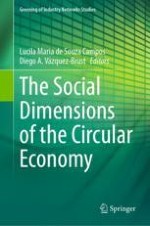
2023 | OriginalPaper | Chapter
1. Introduction – Social Dimension of Circular Economy: Step Forward or Step Back?
Authors : Diego Vazquez-Brust, Lucila M. de Souza Campos
Published in: The Social Dimensions of the Circular Economy
Publisher: Springer International Publishing
Activate our intelligent search to find suitable subject content or patents.
Select sections of text to find matching patents with Artificial Intelligence. powered by
Select sections of text to find additional relevant content using AI-assisted search. powered by